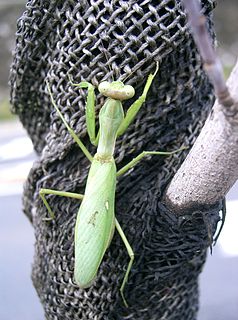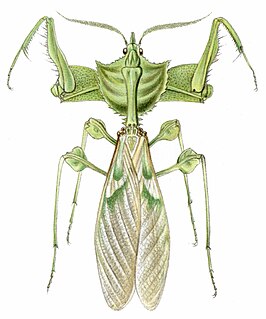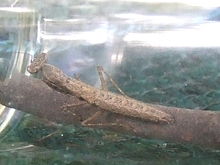
Iris oratoria, known by the common name Mediterranean mantis, due to humans first studying it in lands around the Mediterranean Sea, is a species of praying mantis. Its range is expanding in the Middle East, Western Asia and the United States.

Flower mantises are those species of praying mantises that mimic flowers. Their coloration is an example of aggressive mimicry, a form of camouflage in which a predator's colours and patterns lure prey. The flower mantises are not a natural group with a single ancestor, but most of the species are in the family Hymenopodidae. Their behaviours vary, but typically involve climbing a plant, and then staying still until a prey insect comes within range. Many species of flower mantises are popular as pets.

Choeradodis is a genus of praying mantises with common names such as shield mantis, hood mantis, and leaf mantis because of their extended, leaf-like thoraces. The distinguishing characteristic of Choreododis from which it takes its common names is a laterally expanded thorax. This adaptation for the purpose of camouflage, as well as a rounded wing case and a habit of staying relatively flattened, aid its leaf mimicry.

Phyllocrania paradoxa, common name ghost mantis, is a small species of mantis from Africa remarkable for its leaf-like body. It is one of the three species in the genus Phyllocrania. It is known for its distinct and exclusive camouflaged appearance of a dry weathered leaf.

Brunneria borealis, common name Brunner's mantis, Brunner's stick mantis, or northern grass mantis, is a species of praying mantis native to the southern United States. It is the only mantis species known to reproduce solely through parthenogenesis; there are no males.

Sphodromantis viridis is a species of praying mantis that is kept worldwide as a pet. Its common names include African mantis, giant African mantis, and bush mantis.

Hierodula patellifera, common name giant Asian mantis, Asian mantis, Indochina mantis or Harabiro Mantis, is a species of praying mantis belonging to genus Hierodula.
Deroplatys desiccata, known by the common name giant dead leaf mantis, is a praying mantis from Southeast Asia. This is the type species of genus Deroplatys.

Blepharopsis mendica is a species of praying mantis found in North Africa, parts of the Mediterranean, Middle East and southern Asia, and on the Canary Islands. Devil's flower mantis, Egyptian flower mantis, thistle mantis, and Arab mantis are among its common names.

Idolomantis is a genus of praying mantises in the family Empusidae. It is represented by a single species, Idolomantis diabolica, commonly known as the devil's flower mantis or giant devil's flower mantis. It is one of the largest species of praying mantises, and is possibly the largest that mimics flowers
Oxyopsis gracilis, common name South American green mantis, is a species of praying mantis native to South America. It is a medium sized mantis with adult females reaching 3” in length and adult males growing to about 1.5” in length. Individuals of these species are usually bright green.
Oxyothespis dumonti, common name North African grass mantis, is a species of praying mantis in the family Toxoderidae. It is found in Africa.

Sphodromantis is a large genus of praying mantises concentrated in Africa, sometimes considered a synonym of the genus Hierodula: from the same tribe, Paramantini. Outside their range especially, many share the common name African Mantis.

Bolbe is a genus of praying mantises, sometimes called by the common name ground mantis, that are found in Australia.
Bolbe lowi is a species of praying mantis in the family Nanomantidae. It is endemic to Australia
Bolbe maia is a species of praying mantis in the family Nanomantidae. It is endemic to Australia.
Bolbe nigra is a species of praying mantis in the family Nanomantidae. It is endemic to Australia.
Bolbe pallida is a species of praying mantis in the family Nanomantidae. It is endemic to Australia.

Miomantis paykullii is a species of praying mantis in the family Miomantidae.

Mantises are an order (Mantodea) of insects that contains over 2,400 species in about 460 genera in 33 families. The largest family is the Mantidae ("mantids"). Mantises are distributed worldwide in temperate and tropical habitats. They have triangular heads with bulging eyes supported on flexible necks. Their elongated bodies may or may not have wings, but all Mantodea have forelegs that are greatly enlarged and adapted for catching and gripping prey; their upright posture, while remaining stationary with forearms folded, has led to the common name praying mantis.













